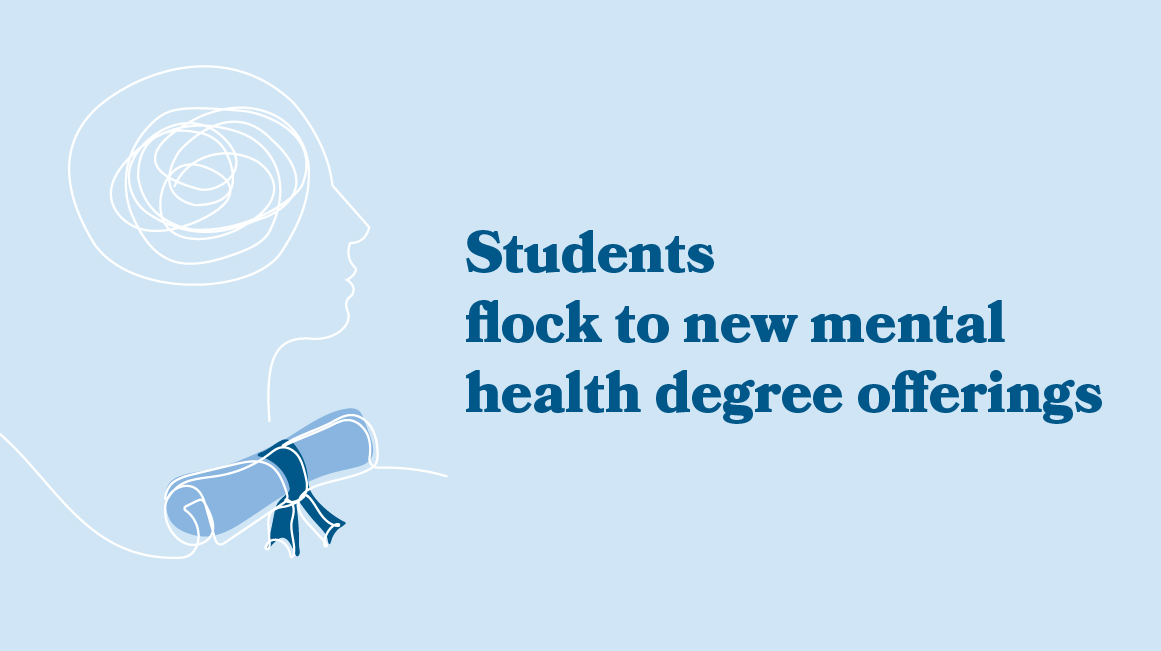Introduction
In recent years, mental health degrees awareness has become more prominent, reflecting an increasing societal understanding of the importance of mental well-being. With growing demand for mental health professionals, many individuals are pursuing mental health degrees to make a tangible impact on the lives of others. A mental health degree equips students with the skills, knowledge, and training necessary to help individuals cope with mental illness, emotional struggles, and life challenges. Whether you’re interested in becoming a counselor, psychologist, or social worker, mental health degrees offer various pathways to a fulfilling career in helping others.
This article explores everything you need to know about mental health degrees, including the different types of degrees, benefits and challenges, career opportunities, and how to choose the right program. If you’re passionate about mental health and want to make a difference in the world, pursuing a mental health degree can be a transformative decision that not only provides personal fulfillment but also contributes to society’s overall well-being.
What is a Mental Health Degree?
A mental health degree is an academic program designed to prepare students for careers in mental health support, therapy, counseling, and research. These degrees provide students with the necessary skills to assess, diagnose, and treat mental health disorders, as well as to offer emotional support to individuals experiencing psychological distress. Mental health degrees often include a blend of psychology, biology, ethics, social work, and counseling courses that prepare students for work in a variety of settings, such as clinics, hospitals, schools, and community centers.
The most common mental health degrees include Associate’s, Bachelor’s, Master’s, and Doctoral degrees. An Associate’s degree may provide foundational knowledge of mental health but is typically not sufficient for clinical practice. A Bachelor’s degree, on the other hand, offers more in-depth training and is a solid foundation for graduate study. Master’s degrees in mental health allow students to specialize in specific areas, such as clinical psychology or counseling. Doctoral degrees, such as a Ph.D. or Psy.D., are the most advanced programs and prepare students for high-level clinical practice, research, or teaching roles.
Mental health degrees differ from other related degrees, such as psychology or social work, due to their specialized focus on mental health issues. While psychology degrees focus on broader aspects of human behavior, mental health degrees concentrate on mental health assessment, treatment, and care.
Types of Mental Health Degrees

Bachelor’s Degree in Mental Health
A Bachelor’s degree in mental health is an excellent starting point for those who wish to pursue a career in the field. This degree typically takes about four years to complete and provides students with foundational knowledge in areas like psychology, mental health disorders, and communication skills. Graduates can find entry-level roles in mental health support, case management, and rehabilitation counseling. With this degree, you can assist licensed professionals in therapy settings or work in mental health facilities, providing essential services such as patient intake, documentation, and basic counseling.
While a Bachelor’s degree is a good mental health degrees starting point, many students opt to pursue a Master’s or Doctoral degree to expand their career opportunities. For those looking to enter clinical practice or advanced counseling, a Bachelor’s degree serves as a prerequisite for further education.
Master’s Degree in Mental Health
A Master’s degree in mental health is typically the next step for those seeking to specialize further. Master’s programs such as a Master of Social Work (MSW), Master of Science in Counseling, or Master of Arts in Clinical Psychology offer a deeper dive into specialized areas, allowing students to focus on topics like substance abuse counseling, family therapy, or clinical psychology. This degree often requires two years of full-time study and includes clinical hours or internships to provide practical, hands-on experience.
Graduates with a Master’s degree in mental health can pursue careers as licensed professional counselors (LPC), marriage and family therapists (MFT), or clinical social workers. Licensing is typically required, which may involve completing post-graduation clinical hours and passing an exam. The level of expertise gained through a Master’s degree provides higher job prospects, allowing graduates to work in hospitals, private practices, schools, and mental health clinics.
Doctoral Degrees in Mental Health
Doctoral degrees, such as a Doctor of Philosophy (Ph.D.) or Doctor of Psychology (Psy.D.), are the highest level of education in mental health fields. Ph.D. programs focus on research, while Psy.D. programs emphasize clinical practice. Both programs prepare students for leadership roles in psychology, research, teaching, and high-level clinical settings. Doctoral programs typically require 5-7 years of study, including completing a dissertation or clinical research project.
Graduates of doctoral programs can work as clinical psychologists, researchers, or educators in universities, research institutions, and private practice. Many doctoral graduates pursue specialized careers in areas like neuropsychology, child psychology, or forensic psychology.
Benefits and Challenges of Pursuing a Mental Health Degree
Benefits
Pursuing a mental health degree offers several compelling benefits. First and foremost, it provides the opportunity to make a significant impact on people’s lives. Mental health professionals play a critical role in helping individuals overcome emotional and psychological difficulties, making the work deeply rewarding. The personal satisfaction of contributing to someone’s well-being can be one of the most fulfilling aspects of this career.
Additionally, the demand for mental health professionals continues to rise. With the increasing awareness of mental health issues and the societal shift toward better mental health care, there are numerous job opportunities available. According to the U.S. Bureau of Labor Statistics, employment in counseling and social work is expected to grow by 12% over the next decade, much faster than the average for all occupations. This growth offers job security and a stable career outlook.
Another benefit is the potential for specialization. Mental health professionals can focus on various areas, such as addiction counseling, marriage therapy, or working with specific populations like children or veterans. This flexibility allows individuals to pursue careers that align with their personal interests.
Challenges
While pursuing a mental health degree has many advantages, it also comes with its challenges. One of the main difficulties is the emotional toll the profession can take. Working with individuals who are struggling with severe mental health issues can be mentally and emotionally draining. Mental health professionals often deal with high-stress situations and must have strong coping mechanisms to manage the emotional demands of the job.
Additionally, the rigorous academic requirements for mental health degrees, especially at the Master’s and Doctoral levels, can be challenging. Students are expected to complete extensive coursework, internships, and clinical hours, often alongside exams and research projects. Licensing requirements can also be complex and time-consuming, depending on the state or country.
Career Opportunities with a Mental Health Degree
Mental health degrees open the door to various career paths in both clinical and non-clinical roles. In clinical roles, individuals can become licensed therapists, counselors, social workers, or psychologists. These roles require strong interpersonal skills, clinical training, and the ability to empathize with clients facing mental health challenges. Mental health professionals often work in hospitals, private practices, schools, rehabilitation centers, and community organizations.
In non-clinical roles, individuals with a mental health degree can pursue careers in mental health education, research, and policy development. Mental health educators work to raise awareness and promote mental well-being through public outreach and community programs. Mental health researchers contribute to the understanding of mental health disorders and effective treatment methods. Policy advisors and consultants work to improve mental health services and advocate for better public health policies.
Specialized roles also exist in areas like substance abuse counseling, marriage and family therapy, and working with specific populations such as children, the elderly, or veterans. These roles offer opportunities to make a difference in targeted communities while focusing on specific mental health needs.
How to Choose the Right Mental Health Degree Program
Choosing the right mental health degree program is a crucial step toward achieving your career goals. Factors to consider when selecting a program include location, accreditation, cost, and specialization options. It’s essential to ensure that the program is accredited by relevant professional organizations, as this will affect your eligibility for licensure and future employment opportunities.
Another important factor is whether you prefer an online or in-person program. Online programs offer flexibility, especially for those with work or family commitments, while in-person programs often provide more direct interaction with faculty and peers. Additionally, practical experience is a key component of mental health programs, so it’s essential to research the internship or clinical placement opportunities available.
Conclusion
Mental health degrees offer an excellent opportunity for those passionate about helping others and contributing to the overall mental well-being of society. From bachelor’s to doctoral programs, there are many pathways to enter the field, each offering unique career opportunities. Though the path to becoming a licensed mental health professional can be challenging, the personal and societal benefits make it a rewarding career choice. Whether you are interested in clinical practice, research, or education, a mental health degree provides the foundation for a fulfilling and impactful career.
FAQs
- What degree do I need to become a mental health counselor?
- A Master’s degree in counseling or social work is typically required to become a licensed mental health counselor.
- Can I work in mental health with a Bachelor’s degree?
- Yes, a Bachelor’s degree can qualify you for entry-level positions, but a Master’s degree is usually needed for clinical roles.
- What is the difference between a psychologist and a psychiatrist?
- Psychologists typically provide therapy and counseling, while psychiatrists are medical doctors who can prescribe medication.
- How long does it take to get a mental health degree?
- A Bachelor’s degree takes about 4 years, a Master’s degree takes 2-3 years, and a Doctoral degree can take 5-7 years.
- What is the job outlook for mental health professionals?
- Job opportunities for mental health professionals are expected to grow much faster than average, with increasing demand for counseling and therapy services.
- Are online mental health degree programs credible?
- Yes, as long as the program is accredited by a recognized accreditation body.
- What are the key skills needed to succeed in mental health fields?
- Strong communication, empathy, problem-solving, and emotional resilience are essential for success in mental health professions.
- What certifications do I need after completing a mental health degree?
- Certification requirements vary by role, but most clinical positions require licensure, which typically involves passing an exam and completing supervised clinical hours.
You May Also Read:https://techlivenews.co.uk/ozemra-reviews/
